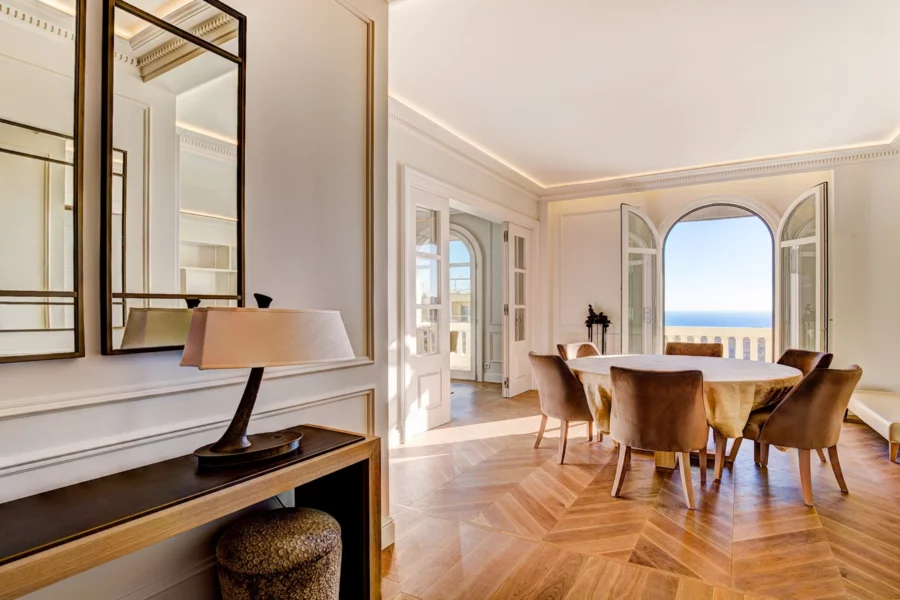
Publié par Paolo Petrini

Law No. 887 of 25 June 1970 defines a protected rental framework for apartments located in old buildings in Monaco (built before 1947).
Studios, one- to five-bedroom apartments, penthouses and prestigious properties
When a dwelling is "under law 887", its lease must be for a minimum period of 6 years, renewable for periods of six years, and it can only be rented to tenants who meet specific criteria (Monegasques, long-term residents or workers in the Principality).
In return, the landlord retains the freedom to set the rent freely (rent not capped or imposed by the State), while respecting the obligation to declare the rental to the Housing Department. This regime therefore offers more flexibility to landlords compared to other stricter laws in the protected sector (such as Law No. 1.235, amended into Law No. 1.291) while guaranteeing enhanced protection for local tenants (stable leases, right of priority, etc.).
In Monaco, there is a real distinction between so-called "old" buildings (built before 1947) and modern buildings. Recent buildings are not subject to any particular rental regulations: this is referred to as the "free sector". After the Second World War, in order to combat soaring property prices, the Principality put in place various social laws to protect Monegasque tenants and assimilated tenants. The objective is simple: to allow long-term residents to continue to live and work in Monaco, without being forced to leave because of rents that have become unaffordable, and thus preserve the economic and social fabric of the country.
Among these texts, Law No. 887, promulgated on 25 June 1970, occupies a special place. It was the first to offer a more flexible framework for the rental of old buildings of good quality or that have remained in the hands of their owners for a long time, while maintaining certain protection criteria for tenants. This law concerns the so-called "old liberalised sector" of the Monegasque market, which is part of the regulated (or protected) sector. It should be noted that there are other laws for buildings built before 1947, such as Law No. 1.235 (now No. 1.291) which applies to the social protection sector. However, Law 887 differs from this by providing more favourable conditions for landlords, while preserving access to housing for protected tenants. (To find out more about Law 1.235/1.291, you can read our dedicated article.)
Over time, the number of buildings affected by these regulations tends to decrease. When an old building is demolished and then rebuilt, it loses its protected status and becomes part of the free sector, thus escaping the constraints of laws 887 and 1291. However, as long as they exist, these old apartments under protection still represent a valuable part of the Monegasque rental market for historical residents. This is why it remains essential, whether you are a tenant or an investor, to understand the specificities of Law 887 before committing to a rental in Monaco. If you are looking for apartments for rent in Monaco, our Petrini Exclusive Real Estate agency can help you in your search. If you are eligible for law 887, please let us know during our first contact.
Law 887 imposes a number of rules specific to the rentals concerned. In summary, here are the main characteristics of the 887 law regime in Monaco:
In summary, Law 887 establishes a balance between the rights of the tenant (stability of the lease, protection against untimely eviction, rents in the old sector generally below the free market) and the prerogatives of the landlord (freedom to rent, choice of the candidate from a closed list, etc.). recovery of the property after 6 years without relocation constraints). This particular framework requires a little more formalities (official declarations, verification of criteria), but it secures the rental relationship and is part of Monaco's housing policy aimed at supporting long-term residents.
Buying a property subject to Law 887 in Monaco has advantages and constraints that must be understood before taking the plunge. This specific status influences the price, the rental conditions and the future valuation.
Precise rules for landlords
An apartment under law 887 imposes certain obligations on the owner. If you want to rent it rather than occupy it, you will have to respect several rules : choose only eligible tenants, offer a lease of at least 6 years, and renounce free seasonal rentals. These restrictions reduce the freedom of management and can limit the rental yield, since the rent is often lower than the free market. Before buying, it is essential to check the status of the property, mentioned in the advertisement or by the seller. Failing that, clues can guide you: year of construction (before 1947), lack of luxury services (lift, parking, swimming pool) or location in certain historic districts. A real estate professional in Monaco will be able to confirm the exact regime.
An attractive purchase price and a rare cachet
On the other hand, apartments under law 887 are generally bought cheaper than those in the free sector. The discount reflects the smaller audience for which they are intended. For an investor, this means accessing property in Monaco at a price that is often much more affordable. These properties are also frequently found in buildings of character, with high ceilings, large rooms, sometimes a garden or an inner courtyard – all rare elements in the city centre and which appeal to lovers of authenticity.
Ideal for a primary residence
If you buy to live in it yourself, the constraints of Law 887 do not apply as long as you personally occupy the property. The rules only govern renting to a third party. You are therefore free to live there for as long as you wish, without eligibility conditions, and the law only " activates " if you rent out. This allows you to buy cheaper, to reside there serenely, and then to make it a secure rental investment later.
A stable investment over the long term
Apartments under law 887 are a safe asset investment: even if the rental yield is generally more moderate, the demand for this type of property remains high among Monegasques and employees in the country. The risk of rental vacancy is therefore limited, especially since the law allows the property to be left vacant temporarily. In the long term, the valuation remains attractive thanks to the scarcity of these homes and the stability of the Monegasque real estate market. In addition, the clear legal framework reduces disputes and simplifies day-to-day management.
In summary, investing in an apartment under law 887 allows you to acquire a property in Monaco at a lower cost, with good asset potential and a certain security, provided that rental constraints are integrated into your strategy.
Law 887 is a major social measure in Monegasque real estate, protecting Monegasques and residents as a priority through access to low-rent and secure lease housing. It guarantees the tenant a long-term lease of 6 years, renewable, with the possibility of leaving the property each year without penalty. For the owner, the law ensures a commitment limited to 6 years, with no obligation to renew, and the possibility of recovering his property at the end of the lease, without having to justify his decision – an advantage compared to stricter measures such as Law 1.235. During the rental, the landlord must comply with certain obligations: to declare any vacancy, to accept only authorized tenants, and to keep the property in good condition.
It is true that many of these apartments are located in old buildings without sea views, large terraces or private parking, due to their time of construction. Very high-end properties have generally been excluded from the protected sector during the various reforms. However, these homes remain very attractive thanks to their central locations, their architectural charm and their generous volumes. Some can also be used as an office or for a liberal profession, which expands their potential for active residents. In reality, Law 887 is not a penalizing constraint for the owner : it offers a compromise between rental flexibility (freedom on rent and the time of re-letting) and social utility, by participating in the supply of housing accessible to residents.
In summary, Law 887 maintains a solid balance between stability for the tenant and freedom for the owner. It is now an integral part of the real estate market in Monaco. If you wish to buy, sell or rent a property subject to this regime, it is essential to be accompanied by experienced professionals. Our agency Petrini Exclusive Real Estate Monaco, a specialist in the Monegasque market, accompanies you at every stage of your project related to Law 887, from the search for the property to the signing at the notary's office. Do not hesitate to contact us for personalized support and make your investment in Monaco a success with complete peace of mind.
Discover this three-room apartment completely renovated and for mixed use, located in a beautiful building with conciergerie. With a total area of 82 square meters, it offers an entrance hall, a large living / dining room, an equipped kitchen, a bedroom, an office, a dressing room, a bathroom and a balcony of 10m² facing south overlooking the city.
3 690 000 €
Discover this three-room apartment located on the 2nd floor of the modern residence "Le Petrel", at 21 Rue Princesse Caroline. This property offers flexibility of use, lending itself to both a home and a professional office, in an idyllic setting on the only pedestrian street in the Principality. Bathed in light and designed with a sleek and delicate aesthetic, this property is located in the immediate vicinity of Port Hercules. It has benefited from a complete renovation, carried out with high quality materials and attention to detail in the finishes.
4 700 000 €
Renovated studio on the 5th floor of the residence "Le Montaigne", Carré d'Or. Mixed-use, ideal for home or office. Bright, view of courtyard and garden, close to the Place du Casino.
1 780 000 €




Contact our real estate agency in Monaco
In which district would you like to search for your future apartment?